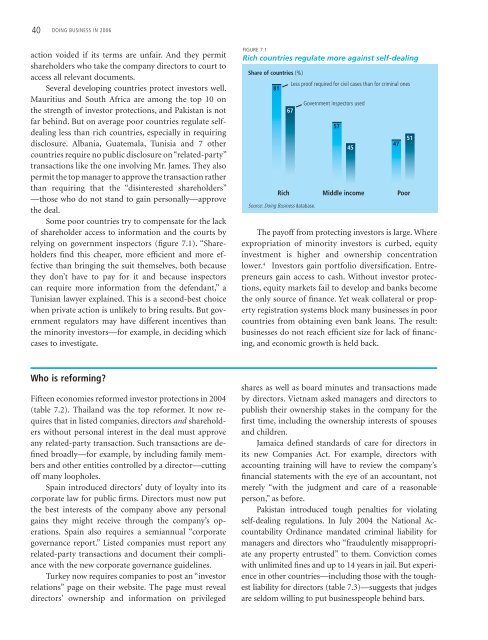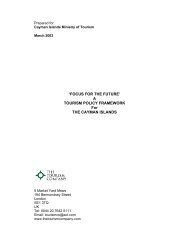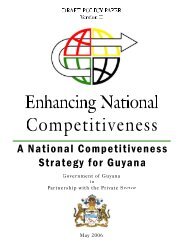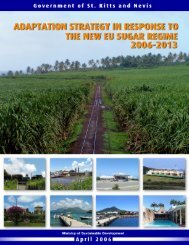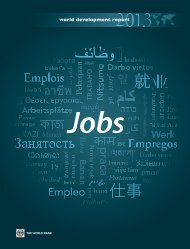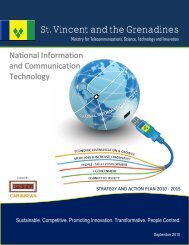Creating
Doing Business in 2006 -- Creating Jobs - Caribbean Elections
Doing Business in 2006 -- Creating Jobs - Caribbean Elections
You also want an ePaper? Increase the reach of your titles
YUMPU automatically turns print PDFs into web optimized ePapers that Google loves.
40 DOING BUSINESS IN 2006<br />
action voided if its terms are unfair. And they permit<br />
shareholders who take the company directors to court to<br />
access all relevant documents.<br />
Several developing countries protect investors well.<br />
Mauritius and South Africa are among the top 10 on<br />
the strength of investor protections, and Pakistan is not<br />
far behind. But on average poor countries regulate selfdealing<br />
less than rich countries, especially in requiring<br />
disclosure. Albania, Guatemala, Tunisia and 7 other<br />
countries require no public disclosure on “related-party”<br />
transactions like the one involving Mr. James. They also<br />
permit the top manager to approve the transaction rather<br />
than requiring that the “disinterested shareholders”<br />
—those who do not stand to gain personally—approve<br />
the deal.<br />
Some poor countries try to compensate for the lack<br />
of shareholder access to information and the courts by<br />
relying on government inspectors (figure 7.1). “Shareholders<br />
find this cheaper, more efficient and more effective<br />
than bringing the suit themselves, both because<br />
they don’t have to pay for it and because inspectors<br />
can require more information from the defendant,” a<br />
Tunisian lawyer explained. This is a second-best choice<br />
when private action is unlikely to bring results. But government<br />
regulators may have different incentives than<br />
the minority investors—for example, in deciding which<br />
cases to investigate.<br />
<br />
<br />
<br />
<br />
<br />
<br />
<br />
<br />
<br />
<br />
The payoff from protecting investors is large. Where<br />
expropriation of minority investors is curbed, equity<br />
investment is higher and ownership concentration<br />
lower. 4 Investors gain portfolio diversification. Entrepreneurs<br />
gain access to cash. Without investor protections,<br />
equity markets fail to develop and banks become<br />
the only source of finance. Yet weak collateral or property<br />
registration systems block many businesses in poor<br />
countries from obtaining even bank loans. The result:<br />
businesses do not reach efficient size for lack of financing,<br />
and economic growth is held back.<br />
<br />
<br />
<br />
<br />
<br />
Who is reforming?<br />
Fifteen economies reformed investor protections in 2004<br />
(table 7.2). Thailand was the top reformer. It now requires<br />
that in listed companies, directors and shareholders<br />
without personal interest in the deal must approve<br />
any related-party transaction. Such transactions are defined<br />
broadly—for example, by including family members<br />
and other entities controlled by a director—cutting<br />
off many loopholes.<br />
Spain introduced directors’ duty of loyalty into its<br />
corporate law for public firms. Directors must now put<br />
the best interests of the company above any personal<br />
gains they might receive through the company’s operations.<br />
Spain also requires a semiannual “corporate<br />
governance report.” Listed companies must report any<br />
related-party transactions and document their compliance<br />
with the new corporate governance guidelines.<br />
Turkey now requires companies to post an “investor<br />
relations” page on their website. The page must reveal<br />
directors’ ownership and information on privileged<br />
shares as well as board minutes and transactions made<br />
by directors. Vietnam asked managers and directors to<br />
publish their ownership stakes in the company for the<br />
first time, including the ownership interests of spouses<br />
and children.<br />
Jamaica defined standards of care for directors in<br />
its new Companies Act. For example, directors with<br />
accounting training will have to review the company’s<br />
financial statements with the eye of an accountant, not<br />
merely “with the judgment and care of a reasonable<br />
person,” as before.<br />
Pakistan introduced tough penalties for violating<br />
self-dealing regulations. In July 2004 the National Accountability<br />
Ordinance mandated criminal liability for<br />
managers and directors who “fraudulently misappropriate<br />
any property entrusted” to them. Conviction comes<br />
with unlimited fines and up to 14 years in jail. But experience<br />
in other countries—including those with the toughest<br />
liability for directors (table 7.3)—suggests that judges<br />
are seldom willing to put businesspeople behind bars.


